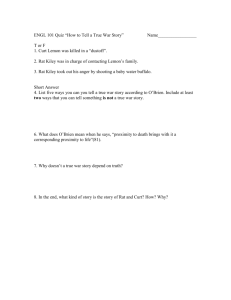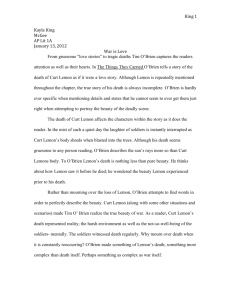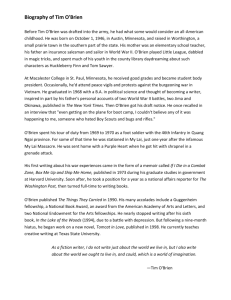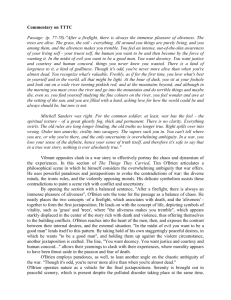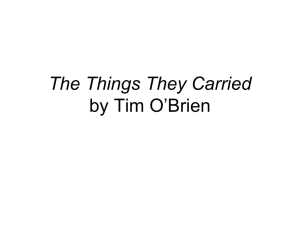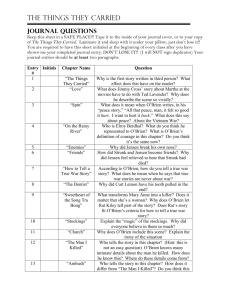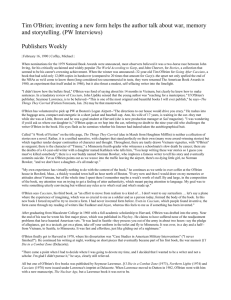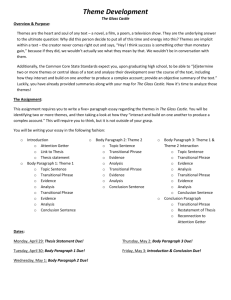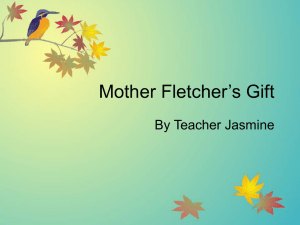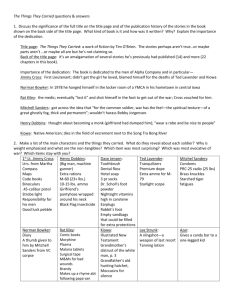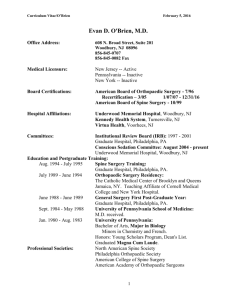Ch 7 & 8 Lecture
advertisement
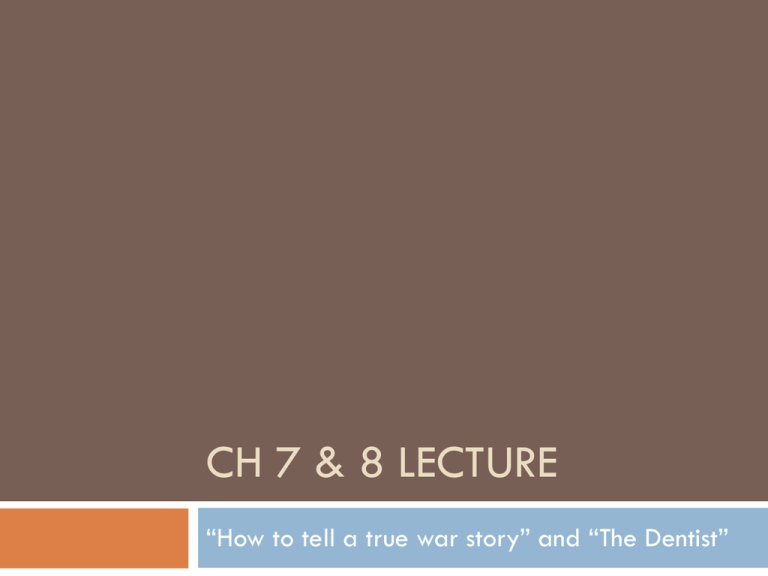
CH 7 & 8 LECTURE “How to tell a true war story” and “The Dentist” “How to tell a true war story” Why does this story start with the line, “This is true” (64)? How does this prepare you as a reader for the story? In what sense is “this” true? As we navigate O’Brien’s narrative, we have already learned how he tends to use a mix of creative non-fiction and realistic fiction while going from story to story. Just like in previous chapter “On the Rainy River” when he starts with “This is one story I have never told before” (37), O’Brien is sucking us into his story. By cluing us in that the following is true, we perk up, sit straighter, and read more carefully. Following this line is Rat Kiley’s vignette about a letter he wrote to a dead friend’s sister. Its unsuspecting/untraditional end provides the reader with a starting place to understand O’Brien’s main point or definition of the true war story much like Galluzzi and I provided you with the disillusionment experience. How do we define disillusionment? How does Lemon’s sister’s response demonstrate irony? In this story O’Brien relates a number of episodes. What makes these episodes seem true? Or to put it another way, how does O’Brien lull you into the belief that each of these episodes is true? Find a few of O’Brien’s elements of a “true war story.” Why does O’Brien believe these elements are important to a “true” war story? “A true war story is never moral” (65) “You can tell a true war story if it embarrasses you.” (66) “In any war story, but especially a true one, it’s difficult to separate what happened from what seemed to happen.” (67) “In many cases a true war story cannot be believe. If you believe it, be skeptical. It’s a question of credibility.” (68) “You can tell a true war story by the way it never seems to end. Not then, not ever.” (72) “In a true war story, if there’s a moral at all, it’s like the thread that makes the cloth. You can’t tease it out. You can’t extract the meaning without unraveling the deeper meaning. “ (74) “True war stories do not generalize. They do not indulge in abstraction or analysis… It comes down to gut instinct. A true war story, if truly told, makes the stomach believe” (74) “Often in a true war story there isn’t even a point, or else the point doesn’t hit you until twenty years later…” (78) “You can tell a true war story by the questions you ask.” (79) O’Brien is trying to explain the difficulty and opaqueness to war’s experience. War is contradictory and not easily described in truth as readers are used to having it spelled out. In what sense is a “true” war story actually true? That is in O’Brien’s terms what is the relationship between historical truth and fictional truth? The truth comes in the gut reaction. The details become unimportant, it is in the irony and fantastic assaulting the human spirit that the reader can then discern the truth. It is the experience of the reader that is true, your emotions, your feelings, your horror that provides truth. If the author is able to create that experience, then and only then do you have a true war story (i.e. Rat Kiley’s cathartic yet torturous act both on the buffalo and the reader- p. 75) The war story is something that is lost in translation of experience and memory. While historical truth is well known for being passed on and censored in favor of the victors, the fictional truth is a vain attempt to provide true understanding however feeble it may be. The two truths can not be the same thing, for neither can substitute actual experience meaning that regardless of the type of truth, in the end, none of it can ever be a truthful experience for the reader only the author and the survivor. According to O’Brien, why are stories important? In your opinion, what do we, as people, need from stories- both reading them and telling them? Why is the baby water buffalo scene (74-76) more disturbing than the death of one of O’Brien’s platoon members and how Dave Jensen sang while picking bits of Lemon from the tree (79)? Why does Rat Kiley torture and kill that baby water buffalo? Explain the complex emotions he experiences in this scene. Once again O’Brien is choosing to provide us with a solid foundation of understanding. Much like you were asked to do in your college essays, O’Brien shows us instead of telling us. “War is hell” (74) is clichéd and overly general so that it has little impact on the human soul. The image of Rat Kiley torturing a baby buffalo because he cannot handle his emotions over Curt Lemon’s death provides a stronger sense of truth that the “gut” or human nature has a visceral reaction to. The image of a baby buffalo suffering and yet refusing to die is a far more vivid testament to war than a hollow cry, “War is hell.” Explain how, according to the narrator, war can be both ugly and beautiful. “But in truth war is also beauty. For all its horror, you can’t help but gape at the awful majesty of combat.” (77) Contradictory nature of war. Look at p. 77-78. Here O’Brien describes the powerful and beautiful reaction human nature has when confronted with death. Particularly his use of imagery of the sunset over the river, again showing rather than telling his main point. “For the common soldier, at least, war has the feel- the spiritual texture- of a great ghostly fog, thick and permanent. There is no clarity. Everything swirls.” (78) O’Brien distorts our perception of beauty and ugly by focusing not on the blood and carnage of Lemon Curtis’ death but on the sunlight and, “how the sun seemed to gather around him and pick him up and lift him into a tree, if I could recreate the fatal whiteness of that light, the quick glare, the obvious cause and effect, then you would believe the last thing Curt Lemon believed, which for him must’ve been the final truth.” (80) On page 81, O’Brien explains, “It wasn’t a war story. It was a love story.” In what sense is this a “love story” and why? What additional things does Tim O’Brien say about war stories at the end of this chapter? “… a true war story is never about war. It’s about sunlight. It’s about the special way that dawn spreads out on a river when you know you must cross the river and march in to the mountains and do things you are afraid to do. It’s about love and memory. It’s about sorrow. It’s about sisters who never write back and people who never listen. “ (81) O’Brien ends with a list of each moral to his individual episodes collected in this one piece. Here we have him reminding the reader that the truth must go deeper than a simple antidotal lesson, the truth of war is a complicated mess of irony, imagery, emotion, and the fantastic. His final sentence reminding us the impossibility of truly conveying war’s realities to an inexperienced person. All we can truly hope for is that the experience of listening to the story will be able to bear enough empathetical truth to affect change. Finally, O’Brien says that “none of it happened. None of it. And even if it did happen, it didn’t happen in the mountains, it happened in this little village on the Batangan Peninsula, and it was raining like crazy…” (81) If O’Brien is not trying to communicate historical fact, what is he trying to communicate? What kind of truth is he trying to relate, and why is the truth set apart from historical truth? Is it okay that this “true” war story may or may not be entirely true? “The Dentist” “He had an opinion of himself, I think, that was too high for his own good. Or maybe it was the reverse. Maybe it was a low opinion that he kept trying to erase.” (82) Curt Lemon went out of his way to become the Hollywood definition of bravery and machismo. His bravado for war and danger was a clear indication of discomfort with the self indicative of a clear emotional immaturity typical in teen soldiers. “He fainted even before the man touched him.” (83) A very unmanly act, an affront to the ultra machismo persona he had worked so hard to create. Why does Curt Lemon pull out his tooth? Lemon must counter his unmanly act by not only facing his fear- that of the unknown (or pain)- by sacrificing a perfectly good tooth and reminding more himself than anyone else how brave and fearless he truly is. O’Brien is showing us how physical pain is easier to face than that of the emotional. Lemon needs to feel pain in order to get over his shame and embarrassment. This of course is juxtaposed by the ridiculousness and absurdity of his actual death- playing catch with a grenade Quick check: how does Lemon’s death demonstrate irony?
